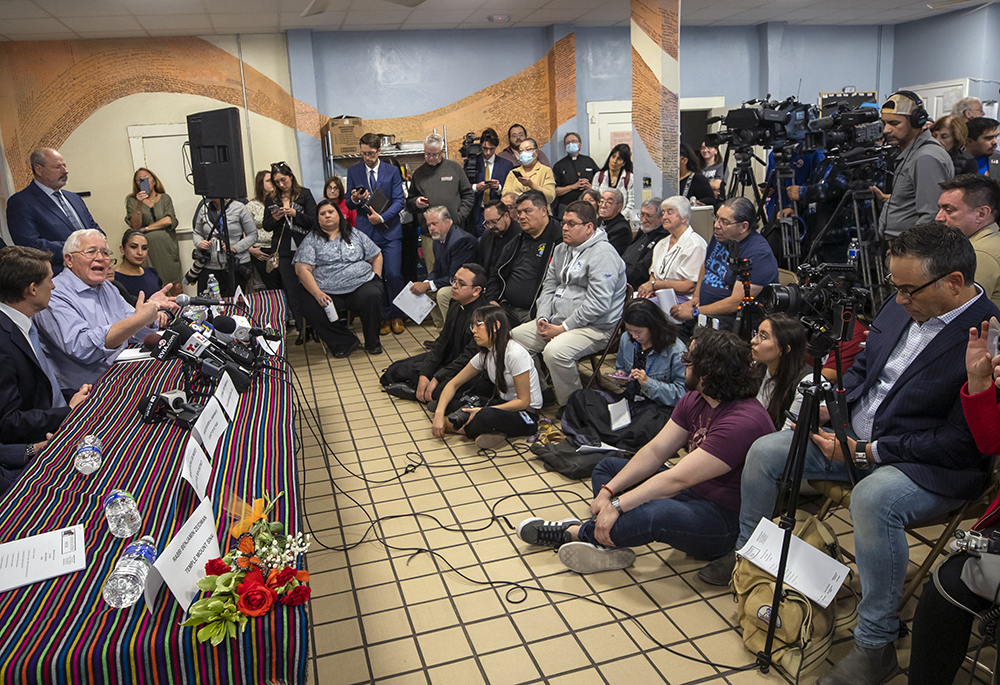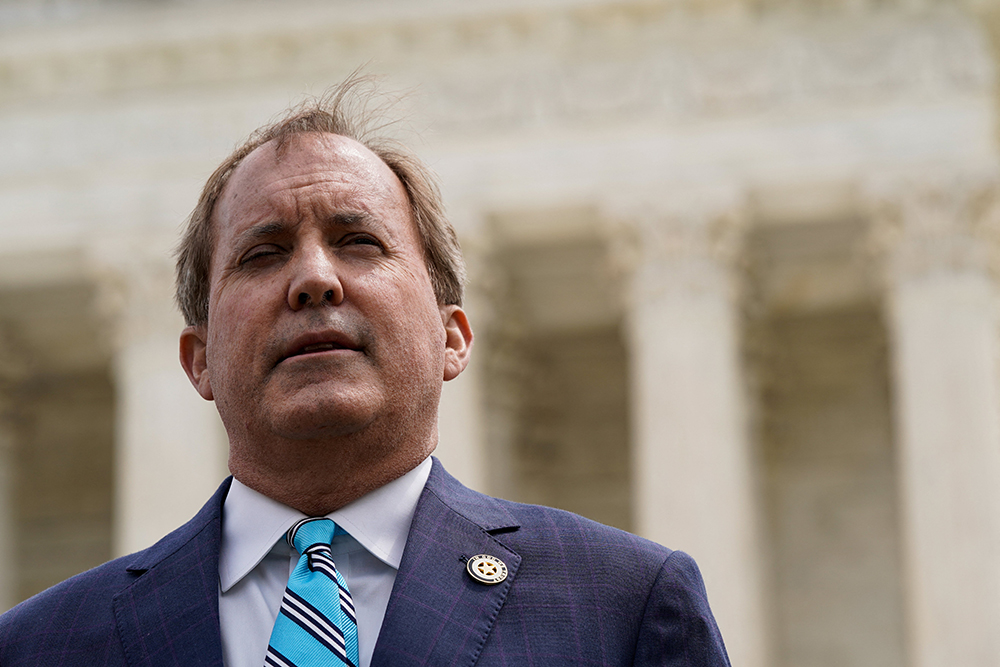
Ruben Garcia, second from left, founder and director of Annunciation House, a network of migrants shelters in El Paso, Texas, speaks during a news conference Feb. 23. Garcia is reacting to the lawsuit filed by Texas Attorney General Ken Paxton that claims the Annunciation House "appears to be engaged in the business of human smuggling" and is threatening to terminate the nonprofit's right to operate in Texas. (AP photo/Andres Leighton)
It's the same drill every election cycle: The rhetoric hits new lows, the vitriol new highs, the tactics and attacks new levels of questionable. Just as predictably, dutifully concerned citizens wring their hands into a gnarled nest. But nothing really changes — everyone just watches and waits for the latest low.
The wait, for now, is over. The target: a Catholic organization in Texas that has worked quietly and effectively to aid immigrants for more than 45 years.
Texas Attorney General Ken Paxton, a Republican who remains under criminal indictment and who narrowly escaped impeachment last year, has gone after those who give humanitarian assistance to asylum-seekers. He has filed a lawsuit against Annunciation House in El Paso, seeking to put the nonprofit out of business and liquidate its assets. Other, similar organizations are under his office's scrutiny, as well.
This signals a new rock bottom in the push to classify all immigrants as criminals of one kind or another. In fact, those who feed and shelter people asking for asylum are now also being labeled criminals, accused by some of complicity in human trafficking across the border. This apparently makes not just Annunciation House, but every diocese that takes up a second collection, every congregation of nuns that sends volunteers, and every Catholic Charities agency that donates clothing or personal items, unwitting patsies in some vast shadowy operation.
And the Texas attorney general is not alone. A shelter in Arizona was visited by two conservative operatives calling themselves "undercover journalists." A pair of Republican congressmen tried to enter the same facility with cameras rolling. One can imagine there will be more such examples to come as this election cycle slogs on.

Texas Attorney General Ken Paxton speaks during a news conference in Washington April 26, 2022, after the U.S. Supreme Court heard oral arguments in President Joe Biden's bid to rescind a Trump-era immigration policy that forced migrants to stay in Mexico to await U.S. hearings on their asylum claims. (CNS/Reuters/Elizabeth Frantz)
By now it is clear that this year immigrants and immigration will be the central wedge issue used to animate voters on the political right. People are starting to feel the effects of an improving economy, stabilized inflation, and higher wages. While many say the overall economic picture is downbeat, they voice optimism about their own personal economic condition and prospects. That means politicians and campaign consultants need to cook up conflict beyond those pocketbook concerns in order to bring their base to the polls.
Enter the migrant issue.
This is not to deny that the country faces a real challenge at the border. Experts of nearly every political stripe agree the nation's immigration system is a mess, causing pain and harm to everyone involved — including asylum-seekers and other immigrants.
It was no surprise, then, that senators from both sides of the aisle recently came together to craft an immigration reform bill. In that process, Democrats — eager to address an issue that they knew had become an election-year distraction — gave in to nearly every point Republicans put forward. These included new authority for the border patrol to shut down the border entry points at a moment's notice, and stricter standards for granting asylum.
Advertisement
But when Donald Trump instructed Republicans to reject the bill so he could continue to stoke the issue until Election Day, House Speaker Mike Johnson quickly obliged. He declared the proposal — which also included funds for Ukraine and Israel — "dead on arrival." Anti-immigrant forces swiftly pivoted to headline-making theatrics over substantive reforms. Ken Paxton's lawsuit made news all over the country — as he, no doubt, knew it would.
But the Texas attorney general's move is more than a stunt. It is, essentially, a lawsuit aimed at Catholic social justice teaching and Gospel values. Matthew 25:35-36 makes explicit the obligations our faith puts on us: to feed the hungry, care for the sick, tend to the needy and invite in the stranger.
People who take those Gospel instructions to heart can do more than wring their hands this time. They can fight back. They can increase support for nonprofits such as Annunciation House in El Paso, the Humanitarian Respite Center in McAllen, Texas, Casa Alitas in Tucson, Arizona, and many others. Catholics can donate money, food, water and clothing; they can volunteer, take up second collections, organize service trips and write letters to the editor. They can create a new narrative at the border.
Simply by doing what we are called to do as Christians, we can counteract the cynicism that pervades this issue and ignores the lives damaged.
Those on the right have for several years now used "religious freedom" as a handy rationale for opposing anything from health care reform to who gets to bake a wedding cake.
But the situation at Annunciation House is far more critical. The Texas lawsuit is unquestionably an issue of who ultimately decides how one lives out the central tenets of their faith. Catholics are not voiceless here. And we must make ourselves heard.



